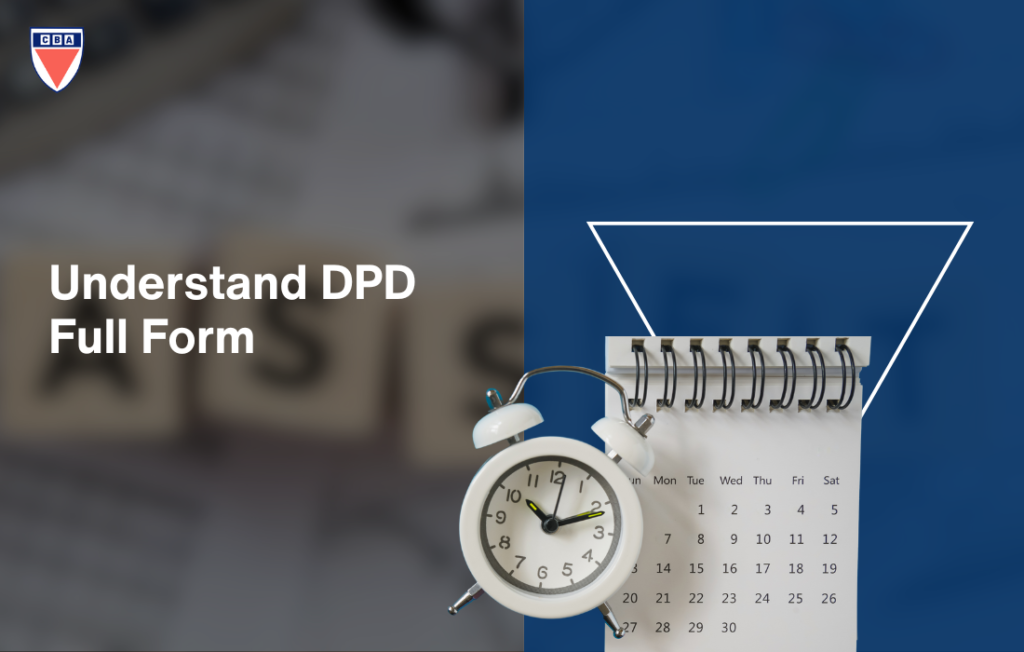Introduction
Have you ever wondered how missing a credit card payment affects your CIBIL score or why lenders are so strict about payment deadlines? You’re about to find out!
Quick Quiz: What does DPD stand for?
A) Days Paid Due
B) Days Past Due
C) Debt Payment Duration
If you guessed B, you’re on the right track!
DPD (Days Past Due) DPD is a key term that can significantly impact your credit accounts and overall credit profile. Whether you’re looking to maintain a good credit score or manage your credit obligations effectively, understanding DPD is vital. But what exactly does it mean, and how does it affect your financial health?8
What is DPD (Days Past Due)?
DPD, or Days Past Due, is a financial metric used to measure the number of days a payment, such as a credit card bill or loan EMI, is overdue beyond its due date. Once a payment is delayed, the DPD count begins, continuing until the payment is made. This metric is closely monitored by lenders and credit information bureaus, as it directly affects your CIBIL credit report and overall credit health.
Late payments, especially on credit card bills and loans, contribute to your repayment history, which is a significant part of your credit reports. Regular delayed payments increase your DPD count and can severely damage your credit score. As DPD accumulates, it becomes more difficult to maintain a good credit score, which is essential for loan approvals and favorable interest rates. Keeping up with timely credit card payments and loan EMIs demonstrates financial discipline and ensures that your creditworthiness remains intact.
Why DPD Matters in Credit Management
One of the biggest reasons DPD in CIBIL report matters is its impact on your credit account and overall credit score. Frequent delays in credit card payment or loan EMI can negatively affect your score, reducing your chances of securing new credit products. Lenders prefer to see low DPD values when assessing new applications, as a high credit score reflects a lower risk. Additionally, maintaining low DPD levels helps in better credit terms and lower interest rates.
To ensure your credit score remains strong, always monitor your DPD, review your credit reports, and keep your credit obligations up-to-date. Paying attention to your DPD is crucial for maintaining a high credit score, which can lead to more financial opportunities in the future.
DPD and Credit Score: The Connection
The relationship between DPD and credit scores is direct and significant. Credit scoring models, such as FICO and VantageScore, heavily weigh payment history, which includes DPD data. Here’s how DPD affects your credit score:
- Immediate Impact: A single late payment can cause a noticeable drop in your credit score, especially if you previously had a good credit history. The longer the payment remains overdue, the more severe the impact.
- Credit Utilisation Ratio: Along with your DPD, maintaining a healthy credit utilisation ratio is crucial. High utilisation, combined with a high DPD, can signal excessive financial strain and further reduce your chances of securing credit.
- Cumulative Effect: Repeated instances of high DPD can lead to cumulative damage to your credit score. Credit bureaus track DPD over extended periods, and consistent late payments signal financial instability.
- Short-Term vs. Long-Term DPD in cibil report: Short-term DPD (e.g., 1-30 days) may have a less severe impact compared to long-term DPD (e.g., 60+ days). However, even short-term DPD can be damaging if it occurs frequently.
- Case Studies: Consider an individual with a credit score of 750 who misses a payment for 60 days. Their score could drop by 90-110 points, bringing it down to the mid-600s. This drop not only affects their ability to secure loans but also increases the cost of existing credit due to higher interest rates.
Managing and Reducing DPD
Managing DPD is essential for maintaining a healthy credit profile. Here are strategies to minimize and manage DPD effectively:
- Set Up Automatic Payments: Automating your payments ensures that you never miss a due date, thus preventing an increase in your dpd number. Most banks and credit card companies offer this feature, which can help you avoid accumulating DPD.
- Use Payment Reminders: Set up reminders on your phone, calendar, or through financial institutions apps to alert you of upcoming payment deadlines. This proactive approach can help you stay on top of your payments.
- Prioritize Payments: If you’re unable to make your payments, prioritize those with the highest interest rates or those that report to credit bureaus first. This strategy can help you minimize the impact of DPD on your credit score.
- Negotiate with Creditors: If you’re facing financial difficulties, contact your creditors before missing a payment. Many lenders offer hardship programs or can restructure your payment plan to avoid DPD.
- Review and Dispute Errors: Regularly check your credit report for any inaccuracies related to DPD. If you find errors, dispute them immediately to avoid unnecessary damage to your credit score.
- Maintain a Buffer: Keep a financial buffer in your accounts to cover unexpected expenses. This buffer can help ensure that you meet your payment obligations even during tight financial situations.
DPD in Business Credit Management
For businesses, managing DPD is crucial for maintaining healthy cash flow and credit relationships. Here’s how businesses can effectively manage DPD:
- Implement Credit Control Procedures: Establish clear credit control policies, including credit checks for new customers, setting credit limits, and enforcing payment terms strictly.
- Use Accounting Software: Leverage accounting software that tracks invoices, sends payment reminders, and flags overdue accounts. This helps in keeping DPD low by ensuring timely follow-ups.
Regularly Monitor DPD: Businesses should track their DPD regularly to identify any overdue payments early. This can be done by generating aging reports that show outstanding invoices categorized by the number of days they are past due. Monitoring DPD helps businesses take corrective actions before the situation worsens.
- Communicate Proactively with Clients: If a client’s payment is approaching the due date and there’s a concern about non-payment, it’s essential to communicate with them proactively. This could involve sending gentle reminders or directly discussing any potential issues that might delay payment.
- Offer Incentives for Early Payments: To encourage timely payments, businesses can offer discounts for early payment. This not only reduces DPD but also improves cash flow.
- Establish Clear Payment Terms: Ensure that your payment terms are clearly communicated to clients at the outset. Include the due date, acceptable payment methods, and any penalties for late payment. Clear terms can reduce misunderstandings and late payments.
- Utilize Collections Agencies as a Last Resort: If a payment remains unpaid despite multiple attempts to collect, it might be necessary to involve a collections agency. While this should be a last resort, it’s sometimes necessary to recover funds.
- Train Staff on Credit Management: Educate your accounts receivable and sales teams on the importance of DPD and how to manage it. A well-informed team can help in preventing overdue payments and effectively managing those that do occur.
DPD and Legal Considerations
Understanding the legal implications of DPD is crucial for both individuals and businesses. Here’s how legal aspects come into play:
- Consumer Protection Laws: Various consumer protection laws govern how creditors can report and handle overdue payments. In many regions, laws such as the Fair Credit Reporting Act (FCRA) in the U.S. protect consumers from unfair or inaccurate reporting of DPD.
- Credit Reporting: Creditors are required to report accurate information to credit bureaus. If you believe there’s an error in your DPD reporting, you have the right to dispute it. The credit bureau is then obligated to investigate and correct any inaccuracies.
- Legal Actions for High DPD: If DPD continues to accumulate without resolution, creditors may take legal action to recover the debt. This could involve filing a lawsuit, obtaining a judgment, or garnishing wages. Understanding the potential legal consequences can motivate timely payments and dispute resolution.
- Statute of Limitations: Each state or country has a statute of limitations on how long a creditor can legally pursue a debt. After this period, they can no longer sue you for the unpaid amount, though the debt still exists, and your DPD can continue to affect your credit report.
- Dispute Resolution: If you disagree with a creditor about your DPD status, you can use dispute resolution methods, such as mediation or arbitration, to resolve the issue without going to court. Knowing your rights and the available legal pathways can help you manage disputes effectively.
- Business Contracts and DPD: Businesses should ensure that their contracts clearly outline the terms of credit, including what constitutes a late payment and the repercussions of high DPD. This clarity can prevent disputes and provide a legal basis for enforcing payment terms.
Future Trends in DPD Management
The landscape of credit management and DPD tracking is evolving rapidly, with new technologies and practices emerging. Here’s a look at future trends:
- AI and Machine Learning in DPD Prediction: Artificial intelligence (AI) and machine learning algorithms are increasingly being used to predict DPD based on historical data, payment patterns, and other variables. These technologies can help businesses and lenders identify at-risk accounts early and take preventive measures.
- Automation of Payment Processes: Automation tools are becoming more sophisticated, allowing for seamless integration of payment reminders, automatic invoicing, and real-time tracking of payments. This reduces the chances of human error and helps keep DPD low.
- Blockchain for Secure Credit Transactions: Blockchain technology is being explored for its potential to create secure, transparent, and immutable records of credit transactions. This could reduce disputes over DPD by providing a clear, tamper-proof record of payment history.
- Enhanced Credit Reporting Standards: As financial regulations evolve, credit reporting standards are likely to become stricter, with more emphasis on accurate DPD reporting. This could lead to changes in how DPD is calculated and reported, benefiting consumers and businesses by reducing errors.
- Mobile and Digital Payment Solutions: The rise of mobile and digital payment platforms is making it easier for individuals and businesses to make payments on time, thus reducing DPD. These platforms often come with built-in reminders and easy payment options that encourage timely payments.
- Consumer and Business Education: As awareness about the importance of credit management grows, there will be an increased focus on educating consumers and businesses about managing DPD. Financial literacy programs and tools will play a key role in helping people understand and manage their credit health.
- Globalization of Credit Practices: With businesses operating in multiple countries, there’s a trend towards standardizing credit practices across borders. Understanding DPD in a global context will become increasingly important, particularly for multinational companies.
Conclusion
DPD, or Days Past Due, is a fundamental metric in the world of credit management. Whether you’re an individual looking to maintain a healthy credit score or a business striving to manage its credit effectively, understanding DPD is crucial. It impacts everything from your credit score to your ability to secure loans and negotiate favorable terms with creditors.
In this comprehensive guide, we’ve explored what DPD is, why it matters, how it fits into the credit cycle, and how it affects your credit score. We’ve also discussed strategies for managing and reducing DPD, particularly in a business context, and examined the legal considerations associated with DPD.
As the world of credit management continues to evolve, staying informed about trends in DPD management and utilizing the latest tools and technologies will be essential for maintaining financial health. By understanding and proactively managing your DPD, you can avoid the pitfalls of overdue payments and ensure a stable financial future.
Monitoring your DPD is not just about avoiding penalties; it’s about taking control of your financial destiny. So, make it a priority to understand your DPD, keep track of it, and take action when necessary. With careful management, you can keep your DPD low and your credit health strong.






